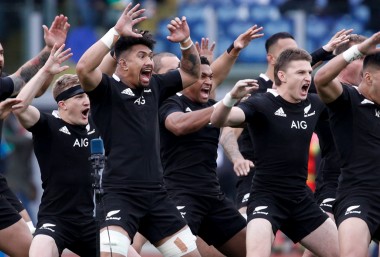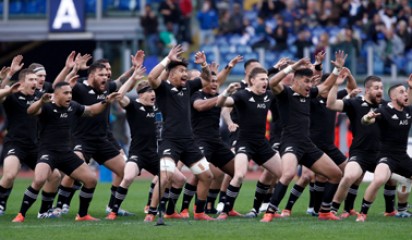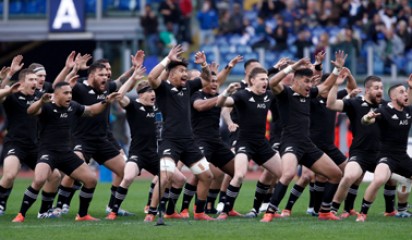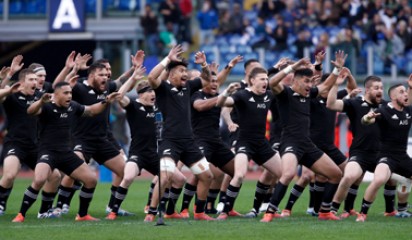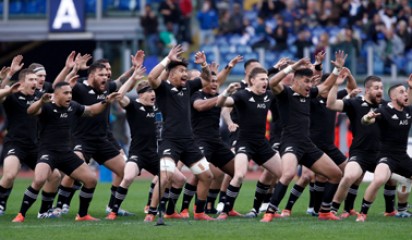Ka mate! Ka mate! Ka ora! Ka ora!
Most of us hear these words and recognise the haka, Ka Mate, has commenced—most commonly indicating that a challenge is being laid down at the start of a sports competition. Sometimes you might also be lucky to hear this haka being performed again as a celebration at the end of the competition after an emphatic win. It is undeniable that this haka unites New Zealanders, not only across the sports field, but also around the world.
Some of us know the true origins of this haka, including the events that led to its composition by Te Rauparaha, a rangatira (chief) of the iwi (tribe) Ngāti Toa Rangatira, and its ongoing cultural importance to that iwi.
A smaller number of us will also be aware the haka Ka Mate has had special protection in New Zealand since 2014 under the Haka Ka Mate Attribution Act.
22 April 2019 marked the five-year anniversary of the Act and imposed an obligation on the Ministry of Business Innovation and Employment (MBIE) to review the Act. There is no deadline to review the Act, but the review must consider whether:
- the interests of Ngati Toa Rangatira relating to Ka Mate are sufficiently protected by this Act and any other relevant enactment or policy of the Crown; and,
- if the interests are not considered to be sufficiently protected, to consider additional protection for them.
The timing of this review couldn’t be better, given that the Rugby World Cup tournament is scheduled for September this year, and, as history tells us, we are likely to see misuse of the Ka Mate haka around this event. In 2015, around the Rugby World Cup tournament that year, we saw a campaign entitled ‘Hakarena’, where English rugby players were involved in a mashed together performance of the Macarena song and the Ka Mate haka, and another promotional video, which showed amateur performances of the haka, all considered unauthorised and offensive uses.
It is highly unlikely that the review of the Haka Ka Mate Attribution Act will be able to adequately deal with any misuse of the Ka Mate Haka overseas, but what are we likely to see?
What special protection does the Haka Ka Mate currently have?
The Act currently grants Ngāti Toa Rangatira the right of attribution.
If the Ka Mate haka is used in a publication, communication, or film, then the person making that publication, communication, or film must include a statement that Te Rauparaha was the composer of Ka Mate and was a chief of Ngāti Toa Rangatira.
Should the person fail to comply with the right of attribution, then Ngāti Toa Rangatira can enforce the right of attribution in the courts and recover their costs in doing so.
This right of attribution does not apply to:
- any performance of Ka Mate, including by a kapa haka group
- any use for educational purposes
- any work made for the purpose of criticism, review or news reporting
- any communication of 1 – 3 that is not for commercial purposes.
Any person wishing to use the haka Ka Mate in a commercial manner is not obligated to obtain consent from Ngāti Toa Rangatira before their use. Nor can Ngāti Toa Rangatira charge, levy, or accept any form of royalties, compensation, or damages in respect of any use of Ka Mate.
Guidance on when the right of attribution applies can also be found here.
What doesn’t the Haka Ka Mate Attribution Act cover?
The deed of settlement between Ngāti Toa Rangatira and the Crown states that nothing in the deed or the subsequent legislation will affect any other current or future intellectual property rights Ngāti Toa Rangatira may have in Ka Mate, or prevents Ngāti Toa Rangatira from benefiting from the Crown's response to future Waitangi Tribunal recommendations.
The WAI 262 report issued in 2011, three years before the Haka Ka Mate Attribution Act was passed, but the government has not fully responded to the recommendations in the report.
The WAI 262 report recommended that kaitiaki (guardians, custodians) of taonga works have the ability to prevent offensive and derogatory use of those taonga works, and that any third parties who wished to use those taonga works in a commercial manner would need to seek consent from the kaitiaki.
The Haka Ka Mate Attribution Act does not provide Ngāti Toa Rangatira with the ability to stop offensive use, derogatory use, or unauthorised commercial use of the haka Ka Mate.
Another important issue is that all costs associated with enforcing the current legislation rest with Ngāti Toa Rangatira. Compare that with the recommendations within the WAI 262 report, which would see the establishment of a commission to assist in the process of regulating the relationships between kaitiaki and users of taonga works.
MBIE is currently consulting on several reviews of our intellectual property legislation, including a review of the Plant Variety Rights Act, consultation on the introduction of a disclosure of origin and traditional knowledge requirement in our Patents Act, and a review of the Copyright Act, all of which look to introduce some aspects of the recommendations from the WAI 262 report.
Given the ongoing misuse of the haka Ka Mate, it is time to review the Haka Ka Mate Attribution Act, and is it time to align the protection for one of our famous haka to that envisaged in the WAI 262 report? We will have to wait and see. Whiti te ra!
